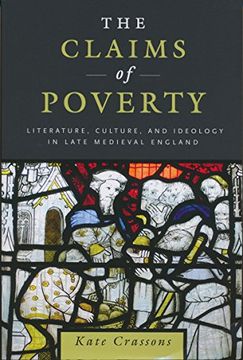The Claims of Poverty: Literature, Culture, and Ideology in Late Medieval England (en Inglés)
Reseña del libro "The Claims of Poverty: Literature, Culture, and Ideology in Late Medieval England (en Inglés)"
In The Claims of Poverty, Kate Crassons explores a widespread ideological crisis concerning poverty that emerged in the aftermath of the plague in late medieval England. She identifies poverty as a central preoccupation in texts ranging from Piers Plowman and Wycliffite writings to The Book of Margery Kempe and the York cycle plays. Crassons shows that these and other works form a complex body of writing in which poets, dramatists, and preachers anxiously wrestled with the status of poverty as a force that is at once a sacred imitation of Christ and a social stigma; a voluntary form of life and an unwelcome hardship; an economic reality and a spiritual disposition. Crassons argues that literary texts significantly influenced the cultural conversation about poverty, deepening our understanding of its urgency as a social, economic, and religious issue. These texts not only record debates about the nature of poverty as a form of either vice or virtue, but explore epistemological and ethical aspects of the debates. When faced with a claim of poverty, people effectively become readers interpreting the signs of need in the body and speech of their fellow human beings. The literary and dramatic texts of late medieval England embodied the complexity of such interaction with particular acuteness, revealing the ethical stakes of interpretation as an act with direct material consequences. As The Claims of Poverty demonstrates, medieval literature shaped perceptions about who is defined as "poor," and in so doing it emerged as a powerful cultural force that promoted competing models of community, sanctity, and justice. "The Claims of Poverty powerfully shows that poverty was both a central and a slippery concept in late medieval England, and that literary texts grappled with its nature and status. Through nuanced readings of key works, Kate Crassons persuasively demonstrates that medieval authors were not only alert to the social and theological meanings of destitution but also understood its complicated social and moral dimensions. This compelling and compassionate book reminds us, too, that while poverty may have emerged as a site of historical and cultural crisis in the fourteenth century, it has lost none of its urgency in the centuries since." --Claire Sponsler, University of Iowa "With The Claims of Poverty, Kate Crassons has written a far-ranging and important study of literary representations of poverty in the Middle Ages. She not only sensitively treats a wide variety of literary sources, from allegory to dream vision to sermon to autobiography to drama, but she also carefully places them within significant historical contexts, from changing labor practices and legislation to antifraternalism to heretical movements. Crassons's analysis of literary texts within the context of these crucially important developments in attitudes toward poverty--whose consequences still remain--demonstrates the profound hermeneutic difficulties that poverty poses then and now." --Elizabeth A. Robertson, University of Colorado at Boulder "Professor Crassons demonstrates both how complex the discussion of poverty is in Piers Plowman and how its analysis of the poor fits into a larger conversation in which literary texts helped form a growing skepticism towards poverty as a virtue in fourteenth- and fifteenth-century England." --Richard Newhauser, Arizona State University

